|
|
|
Sort Order |
|
|
|
Items / Page
|
|
|
|
|
|
|
| Srl | Item |
| 1 |
ID:
158533
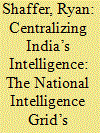

|
|
|
|
|
| Summary/Abstract |
The struggle to ensure information flows to the people who need it while keeping that same information compartmentalized to protect it poses unique problems in the digital age. This effort is further complicated in India where budget constraints, a commitment to democracy, and being a constant target for terrorism tend to severely stretch the security services. In particular, funding for even the country’s Special Forces is problematic and has led to poorly prepared counterterrorism personnel due to limited budgets that prevent the purchase of ammunition for training.
|
|
|
|
|
|
|
|
|
|
|
|
|
|
|
|
| 2 |
ID:
158532


|
|
|
|
|
| Summary/Abstract |
Formal university and college Intelligence Studies degree programs have experienced a pronounced growth in recent years, exhibiting a richness in diversity and engagement in both institutional type and instructional delivery. At face value American academia seems about to embark on a new era of cooperation and understanding with the U.S. Intelligence Community (IC). But in seeking to determine whether progress in this development is as significant as is hoped in Washington, DC, this study reveals a persisting historical concern and academic bias that constrains the latent collaboration. With concerns are over where to house the academic major, how to support campus visits from intelligence representatives, pursue government grants, or how to assess the IC’s influence on specific types of student bodies, Intelligence Studies as a formal degree still faces battles and skepticism on campus. Finally, this work ascertains the impact—positive or negative—these fragile friendships now have on American national security interests and on the future of newly emergent IC personnel.
|
|
|
|
|
|
|
|
|
|
|
|
|
|
|
|
| 3 |
ID:
158528
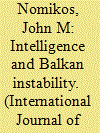

|
|
|
|
|
| Summary/Abstract |
Over the centuries intelligence has been a key instrument of statecraft. But intelligence information can be a double-edged sword. If correctly analyzed and applied, it may show leaders how to avoid calamities and arrive at optimal decisions. In some cases, it can avert a fight and provide the ground for compromise. But when misused and manipulated to advance political aims and preconceptions, it can lead to irreparable disaster and long-term suffering.
|
|
|
|
|
|
|
|
|
|
|
|
|
|
|
|
| 4 |
ID:
158525


|
|
|
|
|
| Summary/Abstract |
Russia’s evident attempts to interfere with the 2016 U.S. presidential election, as well as the plague of “fake news” and the neologism of “alternative facts,” highlight the importance of ensuring informational integrity in policymaking. Think tanks have long been a significant influence in this area and, as a result, have been increasingly targeted by foreign governments seeking to surreptitiously inject their preferences into the American policymaking process.
|
|
|
|
|
|
|
|
|
|
|
|
|
|
|
|
| 5 |
ID:
158534
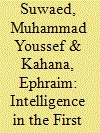

|
|
|
|
|
| Summary/Abstract |
Intelligence skills and security awareness were consistent with the rise and spread of Islam as a new religion.1 According to Muslim tradition, Muhammad habitually sought solitude on Mount Hiraa, near Mecca. One night in the year 610 AD, he had an epiphany: the angel Gabriel appeared in a dream and ordered him to read, but Muhammad refused. Some claim that he was afraid of the magnitude of the mission, while others claim that he was simply illiterate. But when the angel insisted, he read certain verses from the Qur’an. When he awoke he returned home, telling his wife Hadija about the epiphany. Hadija was to first to realize that it was a revelation, and that Muhammad was the emissary of the Lord. Becoming the first believer, Hadija thereafter supported Muhammad every step of the way. Without her it would have been extremely difficult for him to accept the burden of the revelation and the divine mission. See: The Holy Qur’an, Chapter 53—An-Najm (The Star), Verse 4; The Holy Qur’an, Chapter 96—Al-‘Alaq ((The Clot), Verses 1–5;
Emory C. Bogle, Islam: Origin and Belief (Austin: University of Texas Press, 1998), p. 6.
[Google Scholar][Google Scholar]
In its first three years of inception, Islam was an underground movement. The prophet Muhammad (570–632 AD) realized that, due to the hostility of the dominant majority in Mecca, he had to be cautious of his moves and intentions and those of his followers. What was becoming a new religion was revealed to only his most carefully selected and loyal associates. The Prophet knew that, in the preliminary stage, any information spillage could lead to harsh responses from the local civil and spiritual leaders, including measures to suppress this new religious movement. Thus, he adopted secrecy, regarding not only the identity of his selected recruits/believers but also the location of their meeting place—the house of Islam—a secret safe house where he met and preached to those he invited to join the new religion.
|
|
|
|
|
|
|
|
|
|
|
|
|
|
|
|
| 6 |
ID:
158530


|
|
|
|
|
| Summary/Abstract |
The leaking of vast amounts of classified information to the media is a relatively recent phenomenon, with little data or research currently available to explain the behavior. Some parallels with espionage motivation seem to be present, as are certain psycho-social dynamics that appear to stimulate the behavior. Specifically, the intersection of narcissism and disgruntlement seems to supply fertile psychological grounds for mass leaking, as is often the case in espionage. These two elements are often exacerbated by (1) grandiose needs for recognition, (2) a culture of non-restraint, and (3) anonymity. The widely-known Edward Snowden and Bradley Manning cases offer some evidence for beginning an explanatory theory based on these factors.
|
|
|
|
|
|
|
|
|
|
|
|
|
|
|
|
| 7 |
ID:
158529
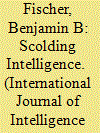

|
|
|
|
|
| Summary/Abstract |
In October 2015, the private sector National Security Archive announced that it had won a 12-year legal battle to obtain a highly classified report prepared by the President’s Foreign Intelligence Advisory Board (PFIAB) in 1990. Titled “The Soviet War,” the document is a 110-page postmortem on an issue that had roiled the Intelligence Community (IC) during the 1980s, namely whether some Soviet leaders actually believed their own warnings and propaganda in claiming that the United States was preparing to launch a “decapitating” surprise nuclear attack on the USSR and its Warsaw Pact allies
|
|
|
|
|
|
|
|
|
|
|
|
|
|
|
|
| 8 |
ID:
158527
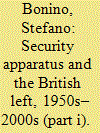

|
|
|
|
|
| Summary/Abstract |
Part I and Part II (forthcoming) focus on the ongoing Undercover Policing Inquiry into past undercover police operations in the United Kingdom, but take a wider perspective and employ a longer historical trajectory to explore the political terrain underpinning the domestic activities of the Security Service and Special Branch vis-à-vis predominantly left-wing and/or radical groups during and after the Cold War. Part I explores the histories, possibilities, and dilemmas of undercover policing of, and intelligence gathering among, political groups and the evergreen Communist and “far and wide left” threats that were perceived as menacing the United Kingdom.
|
|
|
|
|
|
|
|
|
|
|
|
|
|
|
|
| 9 |
ID:
158531


|
|
|
|
|
| Summary/Abstract |
At least six agencies in the U.S. Intelligence Community (IC) now feature memorials for their honored dead. The National Security Agency (NSA) has the National Cryptographic Memorial Wall, the Federal Bureau of Investigation (FBI) maintains a Hall of Honor on its public Website, the Defense Intelligence Agency (DIA) has its Patriots Memorial, the Drug Enforcement Agency (DEA) its Wall of Honor, and the Office of Naval Intelligence (ONI) has both a wall and a garden. But the Central Intelligence Agency’s (CIA) Memorial Wall is the best known. Often featured in popular history, it has been the subject of news broadcasts and a dramatic setting in such public entertainment as motion pictures
|
|
|
|
|
|
|
|
|
|
|
|
|
|
|
|
| 10 |
ID:
158526


|
|
|
|
|
| Summary/Abstract |
Strategic warning long has been a core function of national intelligence services. Many people believe, and U.S. law states, that intelligence can provide no greater service than warning of impending threats to national security.1 For example, the 1992 Intelligence Authorization Act states: “the Intelligence Community’s highest priority is warning of threats to US interests worldwide.” See U.S. Congress, House, Permanent Select Committee on Intelligence, Intelligence Authorization Act, Fiscal Year 1992, 102d Congress, 1st Session, 1991, H. Rept. 102–65, Part I.
[Google Scholar]
The trauma of the Japanese attack on Pearl Harbor in December 1941 prompted the United States to build a post–World War II intelligence structure to prevent future such surprises. Strategic warning became a formal analytic task of the Intelligence Community (IC), along with strategic (or research) intelligence, estimates, and current intelligence.
|
|
|
|
|
|
|
|
|
|
|
|
|
|
|
|
|
|
|
|
|